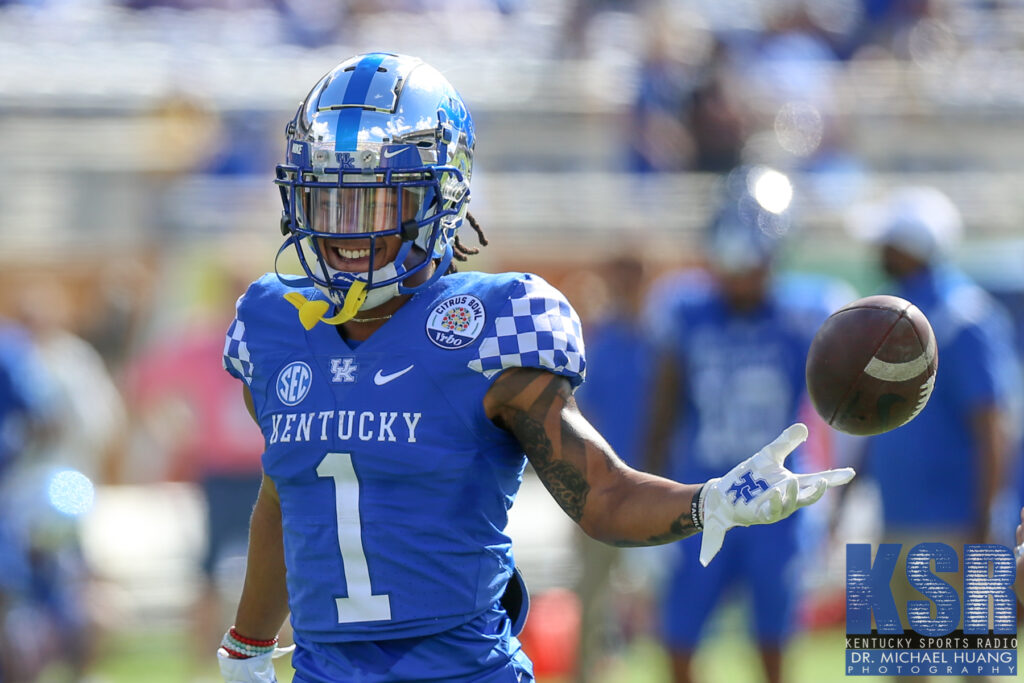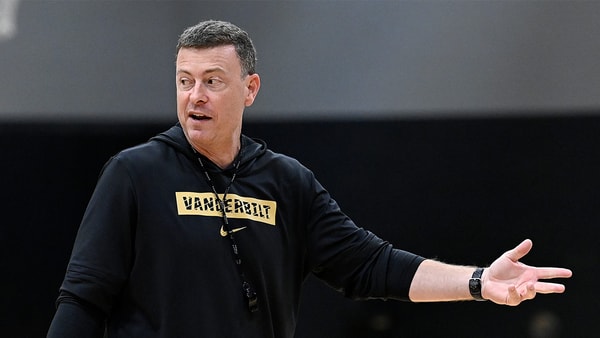Why Kentucky could continue with Sean McVay, Kyle Shanahan coaching tree

For the second time in 14 months, Mark Stoops is looking for a new offensive coordinator. Last year, the defensive-minded head coach did a deep dive and interviewed numerous candidates. Yet, the winner of the search came a bit of left field.
In the end, Kentucky hired 35-year-old Liam Coen to call plays in the SEC after never spending a day in a power conference program or having a No. 1 assistant role on an NFL staff. In three seasons with the Los Angeles Rams (2018-20), Coen served as both the assistant wide receivers coach and assistant quarterbacks coach.
Yet, Stoops tabbed Coen as the next guy in Lexington, and the results were terrific. The Wildcats are beginning a new search thanks to Sean McVay making Coen his new non-play-calling offensive coordinator in Los Angeles. However, many believe that Stoops will stick with the same offensive blueprint and hire someone from the Kyle Shanahan and Sean McVay coaching tree.
On Tuesday, sources told KSR that New York Jets quarterbacks coach Rob Calabrese is a target for the play-caller role in Lexington. The former UCF quarterback has never worked under Kyle Shanahan or Sean McVay, but he is an extension of their coaching tree. Meanwhile, new Kentucky offensive line coach Zach Yenser spent the last three seasons as the assistant offensive line coach of the San Francisco 49ers working directly under Shanahan.
Let KSR tell you why Stoops seems so committed to staying with the system that Coen installed.
Advanced coaching tree
At Oklahoma, Bob Stoops was named the head coaching following the 1998 season, and the new leader of the Sooners knew he had to nail his offensive coordinator hire. After seeing the Air Raid installed at Kentucky by Hal Mumme and Mike Leach have a ton of success in the SEC, Stoops tabbed the latter to be his next play-caller in Norman.
The best thing about that hire is the coaching tree that Leach’s Air Raid offense produced.
After one season at Oklahoma, Mike Leach moved over to Texas Tech to be a head coach in 2000. Leach would spend 10 seasons at Tech, eight years at Washington State, and is entering year three at Mississippi State. The 60-year-old has led his teams to 18 bowl games in 20 seasons and has been a consistent winner. However, his greatest contribution to college football has been his coaching tree.
Art Briles, Sonny Dykes, Dana Holgorsen, and Lincoln Riley are all former offensive assistants under Leach who would go on to be successful college football coaches. Each has a winning record in their career and has been successful at multiple programs. Former players Sonny Cumbie, Neal Brown, Graham Harrell, Josh Heupel, and Kliff Kingsbury have also had big careers in the coaching ranks.
The Kyle Shanahan and Sean McVay trees are doing the same thing in the NFL.
McVay joined the Washington Redskins staff in 2010 and worked under offensive coordinator Kyle Shanahan for four seasons before being named the offensive coordinator in 2014 by new head coach Jay Gruden. During those overlapping years in the nation’s capital, many coaching careers were ignited.
Assistants Matt LaFleur (Green Bay Packers) and Mike McDaniel (Miami Dolphins) worked in the system before getting head coaching opportunities. Meanwhile, Jake Peetz (LSU), Wes Phillips (Minnesota Vikings), Dave Ragone (Atlanta Falcons), and Shane Waldron (Seattle Seahawks) are former staffers who have all received high-level offensive coordinator opportunities.
The branches do not stop there.
McVay has built the best coaching tree in the NFL with the Los Angeles Rams as Kevin O’Connell (Minnesota Vikings) and Zac Taylor (Cincinnati Bengals) have received head coaching opportunities. Greg Olson (Las Vegas Raiders) became an offensive coordinator, Liam Coen was an SEC play-caller, and Jedd Fisch (Arizona) is a Power Five head coach.
Shanahan has seen Mike LaFleur (New York Jets) and Rich Scangarello (Denver Broncos) both move on for offensive coordinator opportunities. Meanwhile, both head coaches have seen NFL teams hire their defensive coordinators as head coaches.
The McVay/Shanahan tree has many, many branches with enough overlap that the two schemes share more similarities than differences.
Quarterback friendly
The basis of this offense is for the attack to be under center with a heavy dose of run that combines play-action passing concepts. The wide zone is supposed to be the primary staple of the offense, and not much true dropback passing is in the playbook because of this.
Therefore, this system has been very quarterback friendly.
McVay and Shanahan both got to the Super Bowl with Jared Goff and Jimmy Garoppolo leading the way. That was achieved thanks to a strong running attack joining forces with a well-time play-action passing attack.
Top 10
- 1
CFP contenders
31 teams remain in contention
- 2
Hunter Heisman
Colorado star becomes betting favorite
- 3New
Klatt predicts CFP
FOX analyst has a new 12-team field
- 4Hot
Michigan loses QB
Carter Smith decommits from Wolverines
- 5
LSU DL back in 2025
Jacobian Guillory makes it official
Under Coen, Kentucky saw under center looks become a heavy part of the offense, but the wide zone and boot game never really materialized. However, the Wildcats had success due to this offense’s ability to feature the slot receiver position.

Thanks to pre-snap motions and condensed formations, smaller receivers in the slot can feast in this offense. Cooper Kupp just won the triple crown playing mostly in the slot for the Los Angeles Rams. Greg Olson turned slot wideout Hunter Renfrow into a true No. 1 for the Las Vegas Raiders. Deebo Samuel was the top receiver for the San Francisco 49ers. In the SEC, Wan’Dale Robinson set program records at Kentucky.
When looking for wide receiver prospects in recruiting, it is usually easier to find inside receivers who can do damage over the middle of the field. Meanwhile, quarterbacks without big-time vertical arm talent can thrive in this system thanks to that between the hashes pass game led by the slot receiver.
All of this adds up to being attractive for Kentucky.
Committed to the running game
During the 2021 NFL playoffs, both Super Bowl teams utilized the Shanahan wide zone offense. However, each had a top-level quarterback who often did not need help opening up the passing game.
Even when facing pressure, both Joe Burrow and Matthew Stafford carved up defenses in the dropback passing game. More times than not, both were better with limited protection out of empty allowing them to read spread out defenses and deliver the ball on time with accuracy on throws with a high level of difficulty.
However, both Sean McVay and Zac Taylor remained committed to the ground game.
In the Super Bowl, the commitment to the run by the Los Angeles Rams created a ton of short possessions and gave the Cincinnati Bengals multiple chances to extend a second half lead. In the AFC Championship, Taylor stayed committed to the run despite the first half appearing to be a shootout with Patrick Mahomes and the Kansas City Chiefs. Each coach sticks to what they know because of the belief in this system.
Adjustments must be made depending on personnel, and we’ve seen this style of offense do that through multiple coaches. However, everything is built on establishing the run. Under Mark Stoops, Kentucky has established itself as one of the best rushing attacks in the SEC year after year.
The Wildcats prefer to stay run-first, and the McVay/Shanahan system allows them to do that. However, the throw game blends with the ground game allowing Kentucky to now hurt teams through the air.
With the hire of Liam Coen, Mark Stoops has found the system he wants for the Kentucky football program. Finding someone who can run it effectively from that McVay/Shanahan coaching tree makes a lot of sense.









Discuss This Article
Comments have moved.
Join the conversation and talk about this article and all things Kentucky Sports in the new KSR Message Board.
KSBoard